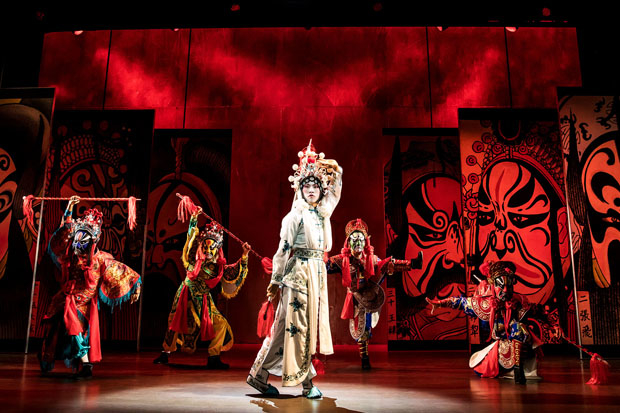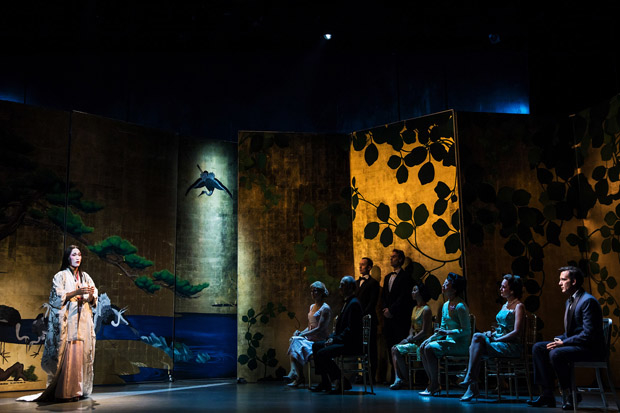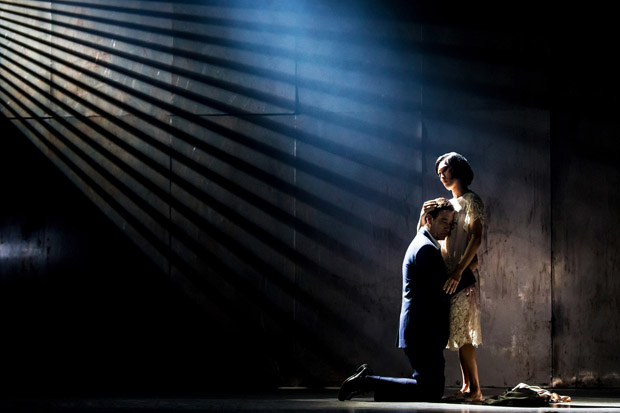M. Butterfly
David Henry Hwang’s Tony Award-winning play returns to Broadway in a new production directed by Julie Taymor.

(© Matthew Murphy)
Song Liling is ostensibly a man who plays female roles in the Chinese opera, but she is actually a woman masquerading as a male actor to escape the limits of a misogynist society. At least, that is what she tells her male lover — and who are we to question her preferred gender pronoun? With all we know about gender today, David Henry Hwang's M. Butterfly feels a lot more plausible than it must have in 1988, when it first appeared on Broadway. Director Julie Taymor's stylish revival at the Cort Theatre attempts to seduce us into belief, to make its Shakespearean gender-play seem not only plausible but understandable.
Believability has always been an issue with M. Butterfly, despite the fact that it is based on real events. It tells the story of French diplomat Rene Gallimard (Clive Owen) and his 20-year relationship with Chinese actor Song Liling (Jin Ha), whom he first encounters in 1964 singing an aria from Puccini's Madama Butterfly at the Swiss ambassador's residence in Peking. Gallimard is obsessed with that opera and begins to see Song as his own version of its self-sacrificing heroine. He never suspects, however, that Song is actually a man using their clandestine affair to gather intelligence for the Chinese Communist government. The fact that Song refuses to be seen naked, even when they are having sex, just seems to reinforce her "oriental" modesty in his mind. Suspension of disbelief like this could only be achieved by a true opera fanatic.

(© Matthew Murphy)
At least, that's what we are led to believe at the start of the play, when we see a gaggle of martini-swilling Westerners sarcastically toasting Gallimard and his credulity. But Hwang has made significant rewrites to his script to illuminate both Song's side of the story and the graphic details of her sex life, casting shadows of doubt on easy conclusions. State coercion plays a role in the form of Communist apparatchik Comrade Chin (made perfectly loathsome in a mouth-breathing performance by Celeste Den). She demands results from Song while disparaging her methods. Later, a French court commands a very different performance when Song (now wearing a man's suit) takes the stand against Gallimard. We get the sense that this consummate actor can be any gender the moment requires in order to survive.
Ha's believably feminine performance undergirds our uncertainty. With a powerful countertenor voice, Ha glides through every scene with mannered poise and grace. He adds the slightest British lilt to his speech for an air of international sophistication. It all adds up to a beautiful fantasy of femininity.
As portrayed by Owen, Gallimard is a man completely engrossed in that fantasy. With a voice as rich as chocolate mousse, he narrates for much of the play, becoming irritable whenever Song attempts to interject with any information that might break the illusion of a submissive Asian woman hopelessly in love with a Western man. Hwang makes it clear that Gallimard's poor diplomatic analysis (he is wrong about the Vietnam War at every turn) has everything to do with his faulty notion that the East is always submissive to the dominant West.
Taymor (making her first return to Broadway since the ill-fated Spider-Man Turn Off the Dark) artfully constructs Gallimard's orientalist dream, right down to Song's wigs: Designer Dave Bova creates hair that is voluminous enough to mitigate Ha's masculine features without ever straying into drag queen territory. The first-rate production comes complete with colorful costumes by Constance Hoffman and a versatile set of sliding panels by Paul Steinberg. Kurogo (traditional Japanese stagehands) lurk behind those panels, giving the impression of a bustling metropolis in which everyone is listening from just behind a paper-thin wall. Lighting designer Donald Holder creates a world of shadow and illusion, while sound designer Will Pickens and composer Elliot Goldenthal underscore it with beautiful music.

(© Matthew Murphy)
Ma Cong's vibrant choreography brings the Chinese opera to Broadway, although a socialist realist dance signifying the Cultural Revolution goes on a little too long without adding much to the story. We already get the Communist aesthetic in Taymor's choice to have all of Gallimard's correspondence delivered by a courier who appears to have escaped from a Meyerhold biomechanics workshop. Minor quibbles about the play's occasionally sluggish pace shouldn't obscure the point that no other Broadway director comes close to Taymor's magpie talent for incorporating diverse theatrical forms into a singular vision.
It helps to have a strong director for a play like M. Butterfly, which is all about the triumph of illusion over the human mind — about how belief trumps evidence. In a time in which facts are increasingly treated as irrelevant in the public sphere, that message feels awfully prescient.









